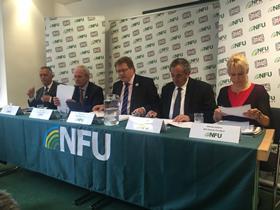
The NFU has named securing a future labour supply as a top priority in Brexit negotiations.
The union, which held an extraordinary council meeting on Friday 1 July, has called on the government to establish a student agricultural workers’ scheme, open to students from all around the world, to help meet the industry’s labour needs.
Without it, NFU claims, the horticulture sector faces a future in which growers could quit or move production overseas, defeating aims to increase British production.
NFU president Meurig Raymond said that in the buildup to the referendum, it had proved difficult to get answers from the Leave camp on how they would deal with the labour situation, but that policies now had to be put into place.
“The horticulture sector in particular is extremely dependent on non-British labour,” Raymond added. “If we are going to grow that sector it’s important that access to labour is there. So we’ve argued for some time following the abolishment of the Seasonal Agricultural Workers’ Scheme that they ought to be looking at a student workers’ scheme and those discussions have been taking place over the last couple of months.”
There are an estimated 25,000 non-British seasonal workers picking, packing and processing fruit and vegetables in this country every year, and Raymond described the possibility of a shortage of labour as a “huge threat to an extremely important sector of British farming.”
As part of its response to the referendum result, the NFU has launched what it called its biggest farming consultation for a generation, quizzing its members on what they want to see from a newly independent Britain.
The union has established the principles of a domestic farming policy for England and Wales, with key principles being market access to the rest of Europe; trade agreements with the rest of the world; access for imports; labour sourcing; subsidies; rural development issues; and regulation.



